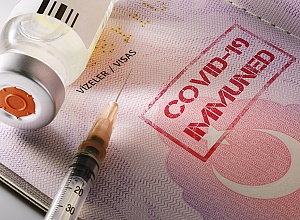Privacy advocates have undercut tracing apps, while anti-maskers claiming a rights invasion have damaged an effective protection mechanism. Now, writes Prof Peter Baldwin on CNN, vaccine passports have become yet another occasion to score ideological points.
Baldwin, professor of history at the University of California-Los Angeles, writes:
Forgive me for thinking that the midst of a global pandemic that cost millions of lives and trillions of dollars in economic loss is not an ideal moment to parse the fine points of individual rights. COVID has already sparked political fires over how to rein it in.
Privacy advocates have undercut contact tracing apps' use. This technology would have permitted us to go about our business – unless we were unfortunate enough to contract infection. Then we would have been alerted to isolate. That was certainly preferable to the alternative we were left with – most everyone stuck at home in lockdown.
The claims that mask-wearing in public violates civil rights is too ludicrous to discuss – were it not for the many who seem to believe so. In seemingly every western democracy, anti-mask movements, organisations and parties have arisen to protest the affront they consider the requirement to protect themselves and others.
The same libertarians who are resigned to seat belts, cycle helmets and condoms have resisted the single most effective personal protection against a respiratory contagion. "No shirt, no shoes, no service," provokes nary a murmur, but "please wear a mask" is a red flag to the live-free-or-die crowd.
The highly debated vaccine passports allow us to scratch this political itch once again. As lockdowns are eased – but before we have achieved herd immunity – allowing the vaccinated to begin travelling, attending events and eating out would help restart the economy. To identify the vaccinated, some sort of attestation, such as a so-called passport, has been suggested as a stopgap measure.
The libertarian right all are raring to turn this into another culture war. But passports should be a technical issue, helping us exit the pandemic, not yet an occasion to score ideological points.
Vaccine passports are a temporary measure, useful during the interval while many are vaccinated, but before herd immunity has arrived. A different solution is needed for the few who have medical reasons to avoid vaccination. They must be given the benefits of inclusion in the scheme. For others, passports will distinguish those vaccinated from the rest.
So long as not everyone is eligible for a shot, passports are unfair. How can we allow the vaccinated into theatres, events, restaurants, or airplanes, keeping out the unvaccinated?
For one thing, we must distinguish between vaccine certification for domestic activities (amusements and the daily pursuits we long for) and for international travel. Objecting to it for flights abroad makes as little sense as fussing about conventional passports. But for what we do at home, the situation is trickier.
Once everyone has been offered a vaccine, however, the situation changes. Those without passports would then become the refuseniks, who have voluntarily rejected contributing to herd immunity. We would then be distinguishing between the safe and others, the outcome of a freely chosen decision.
Whether we have passports or not, as a society, we will soon need to decide how to treat our fellow citizens who clear-eyed and consciously refuse to participate in the collective project of herd immunity. Anti-vaxxers, have objected to inoculation ever since the first vaccine against smallpox became a public health mandate in the late nineteenth century. Some raise religious objections.
We accommodate religious objections to other mandates, such as military service and schooling, so long as only few demand them. If anti-vaccine people do not disrupt the 70% or 80% compliance required for herd immunity, that may also now be possible.
Others object that requiring vaccination violates civil rights, seen from each individual's point of view. So does the prohibition of storing inflammables in the basement, keeping pigs in the backyard, driving too fast, and all other of the countless regulations that make civilised metropolitan society possible.
None of us are monads, living in splendid isolation. Citizens are no different from physicians; our first duty is to do no harm. Holding us liable for damaging or even just endangering others is the bread and butter of the law.
Those who reject shots remain a threat to others. They spurn the solidarity of vaccination, which by now has become an expectation of citizenship. Should they be allowed to participate where they pose a threat? If not, how can we know whom to worry about without certification? Vaccine passports do not create that dilemma, the unvaccinated do.
Constant widespread testing might offer security much like vaccination, but only with similar rights violations. The aim would be the same, too: knowing who poses a threat. Vaccine certification violates privacy no more than COVID testing. The point of testing, as with passports, is to make crucial information known and useful. When those posing a threat do not even know they are a danger, how can there be privacy rights?
Eventually, we may achieve herd immunity, and the pandemic will sputter out. So too will the passport issue. Insofar as COVID becomes endemic, needing vaccinations and boosters, it will be like other diseases we vaccinate against and require certification of – school enrolment, group sports, or travel abroad.
Reaching herd immunity in the US is possibly months away (though there's no guarantee of reaching it), and, given current vaccination rates, it could take at least another year for the rest of the world to be sufficiently protected to reduce the threat of reinfection."
But in the meantime, we face a dilemma that is not created by vaccine passports, merely revealed by them.
Full CNN opinion piece (Open access)
See also MedicalBrief archives:
10 reasons why immunity passports are a bad idea
COVID-status certificates may be discriminatory — UK rights watchdog

